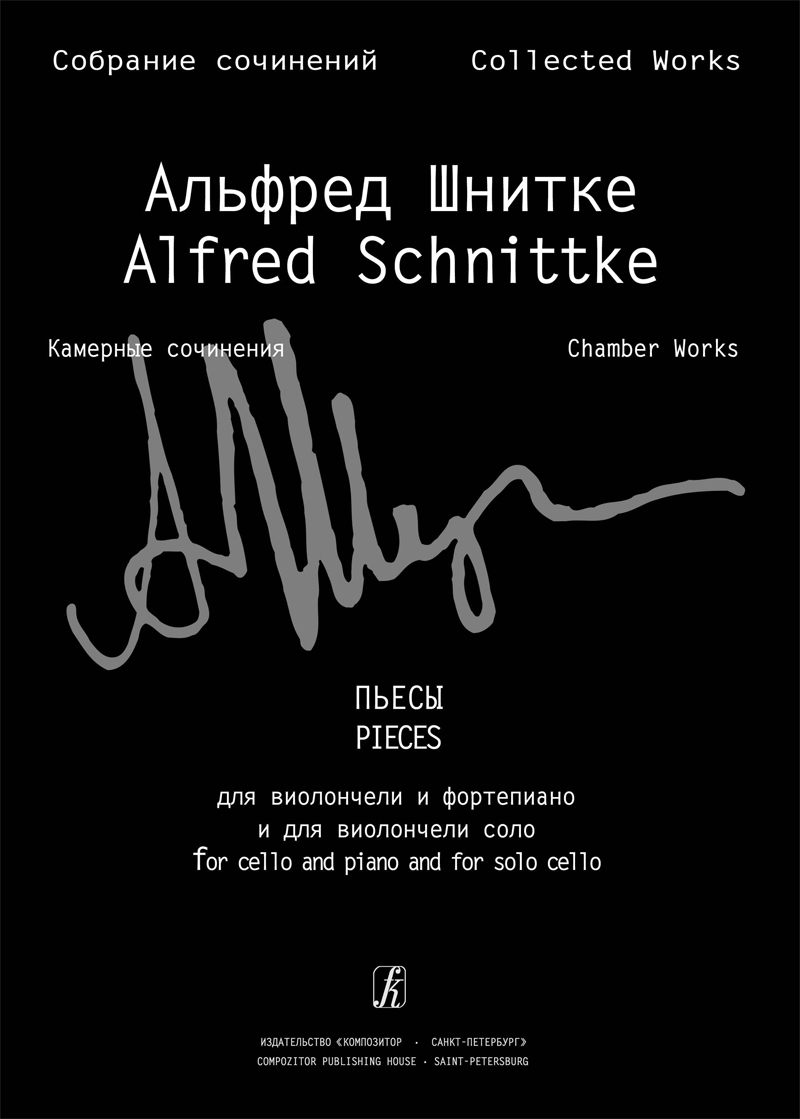
Schnittke A. Pieces for Cello and Piano and for Solo Cello (Coll. Works. S. 6, Vol. 2, P. 3)
- Author:
- Schnittke A.
- Author (full):
- Alfred Schnittke
- Title (full):
- Collected Works. Critical edition based on the composer's archive materials. Series 6. Chamber Works. Volume 2. Works for Cello and Piano and for Solo Cello. Part 1. Pieces for Cello and Piano and for Solo Cello
- Number of pages:
- 28+4
The publication of Alfred Schnittke’s Collected Works is a joint project of the Compozitor Publishing House • Saint-Petersburg and the Alfred Schnittke Archive at Goldsmiths College, University of London. This critical edition is intended for performers, scholars and music lovers interested in Schnittke and his music. Its main purpose is to provide them with access to his scores, which are not readily available in Russia or elsewhere. All the scores have been checked against Schnittke’s manuscripts and existing publications of his music аnd have been edited by leading performers who collaborated with the composer.
Musica Nostalgica for cello and piano is Schnittke’s arrangement of the Minuet from his Suite in the Old Style for violin and piano (1972), made for Mstislav Rostropovich in 1992. There is another arrangement by Schnittke of the same music for two violins, in which the composer also gives some indications implying the possibility of performance by violin and cello. Musica Nostalgica was premiered by Rostropovich in 1992 in Tokyo and recorded for compact disc by Alexander Ivashkin and Irina Schnittke in 1998 on the Chandos label.
Klingende Buchstaben / Sounding Letters was written in one day in September 1988 as a birthday present for Alexander Ivashkin. As the title suggests, letters of the alphabet take on an important symbolic role in the work. Schnittke uses musical monograms based on his own name (A. Schnittke) and that of the dedicatee (Alexander Wassiljewitsch Iwaschkin) as the main material for the piece.
Klingende Buchstaben was premiered by Alexander Ivashkin at the “Alternativa” Moscow Festival on 28 December 1988 in the Glinka Museum Concert Hall and recorded by him in 1990 for a compact disc on the Melodiya label.
Madrigal in Memoriam Oleg Kagan was composed in 1990, the year of the violinist’s death. Schnittke collaborated with Oleg Kagan (1946–1990) on many occasions, most notably on the Violin Concerto No. 3, which was written for Kagan, and the Concerto Grosso No. 2, written for Kagan and his wife, the cellist Natalia Gutman. Madrigal exists in two versions. In the composer’s own words, “it should ideally be played twice in the same concert: the violin version at the beginning and the cello version at the end.”
The piece is based on a range of musical oppositions, each alluding to the concepts of “alive” and “dead”.
The cello version of Madrigal was premiered by Natalia Gutman on 13 July 1991 in Kreut (Germany). In 1995 it was recorded by Alexander Ivashkin for a compact disc on the Ode label.
Improvisation for solo cello (1993) was commissioned by the Fifth Rostropovich International Cello Competition in Paris (1994) at the initiative of Rostropovich himself, who also edited the piece for the competition. This virtuoso piece is typical of Schnittke’s later work, in that it is built around contrasts between different types of musical material: quarter-tones, chromatic and whole-tone movement, passages and chords based on open fourths, and also music based on wide intervals and on long, ascending passages. These different musical types are often presented in their most basic form, as musical “elements”.
The piece takes the form of a set of free variations, moving further and further from the original theme. However, it is also possible to read the structure as an interaction between two musical ideas. The first idea is made up of active and rhetorical music, such as the long, continuous passages and the nervous, dissipated phrases. These are contrasted by a second idea comprising passages of apparent stasis formed with double-stopped notes in sevenths and ninths, repeating like Morse code.
Improvisation was premiered by Mstislav Rostropovich on 19 June 1994 in Paris. The first recording was made by Alexander Ivashkin in 1995 for the Ode label.
Alexander Ivashkin, 2011
Contents:
A sketch for Klingende Buchstaben / Sounding Letters
Preface
Editorial Notes
Legend
Musica Nostalgica for cello and piano (Music text example)
Klingende Buchstaben / Sounding Letters for solo cello
Madrigal in Memoriam Oleg Kagan for solo violin or cello. Cello version
Improvisation for solo cello (Music text example)
Comments
- Author
- Schnittke A.
- Author (full)
- Alfred Schnittke
- Title (full)
- Collected Works. Critical edition based on the composer's archive materials. Series 6. Chamber Works. Volume 2. Works for Cello and Piano and for Solo Cello. Part 1. Pieces for Cello and Piano and for Solo Cello
- Number of pages
- 28+4
